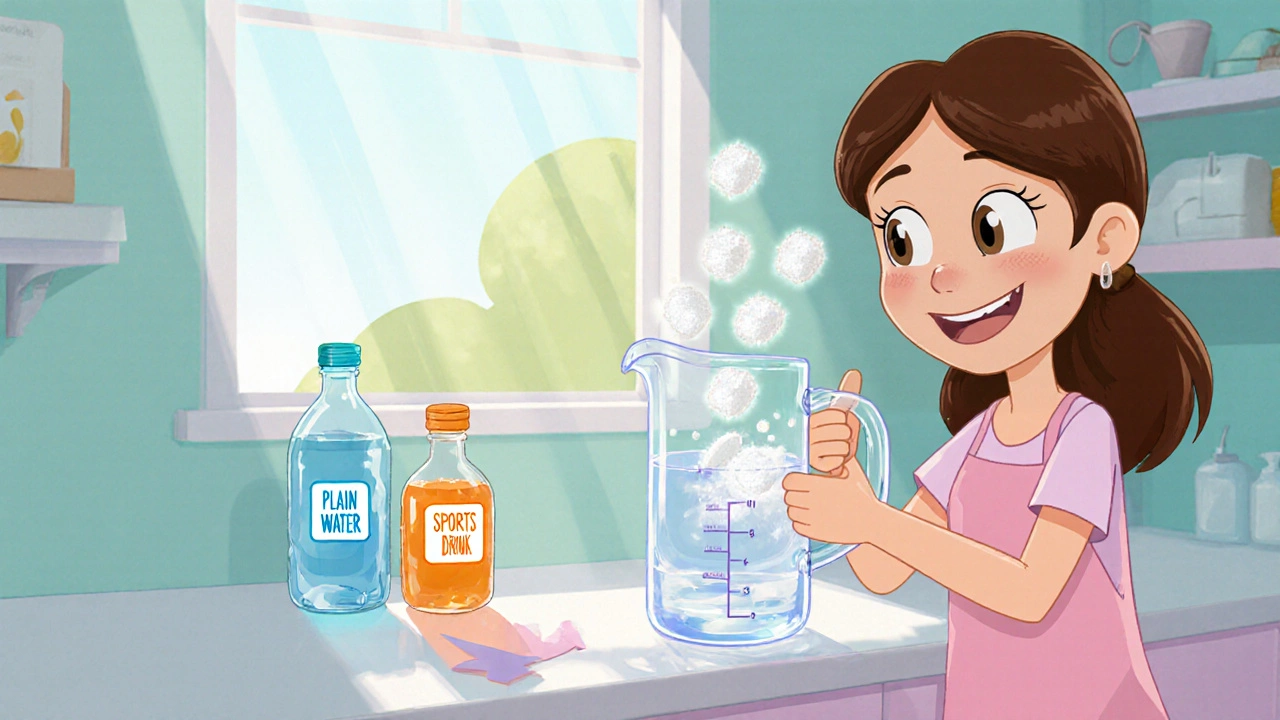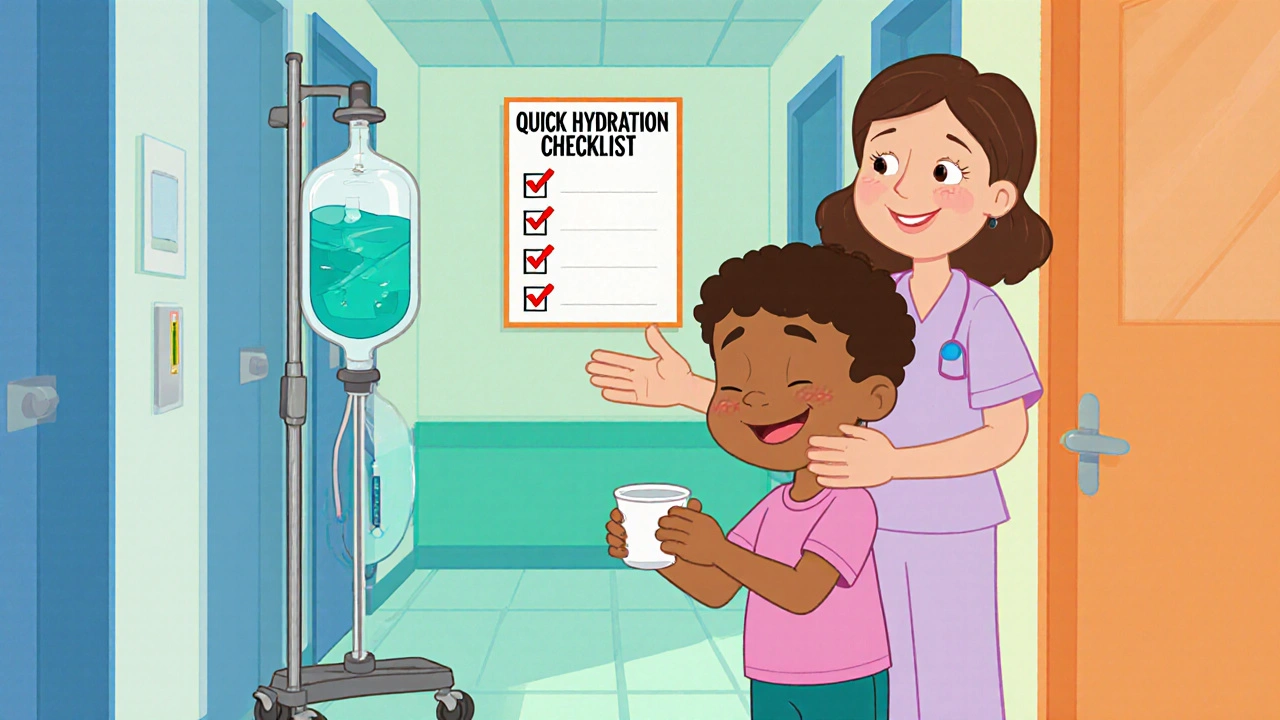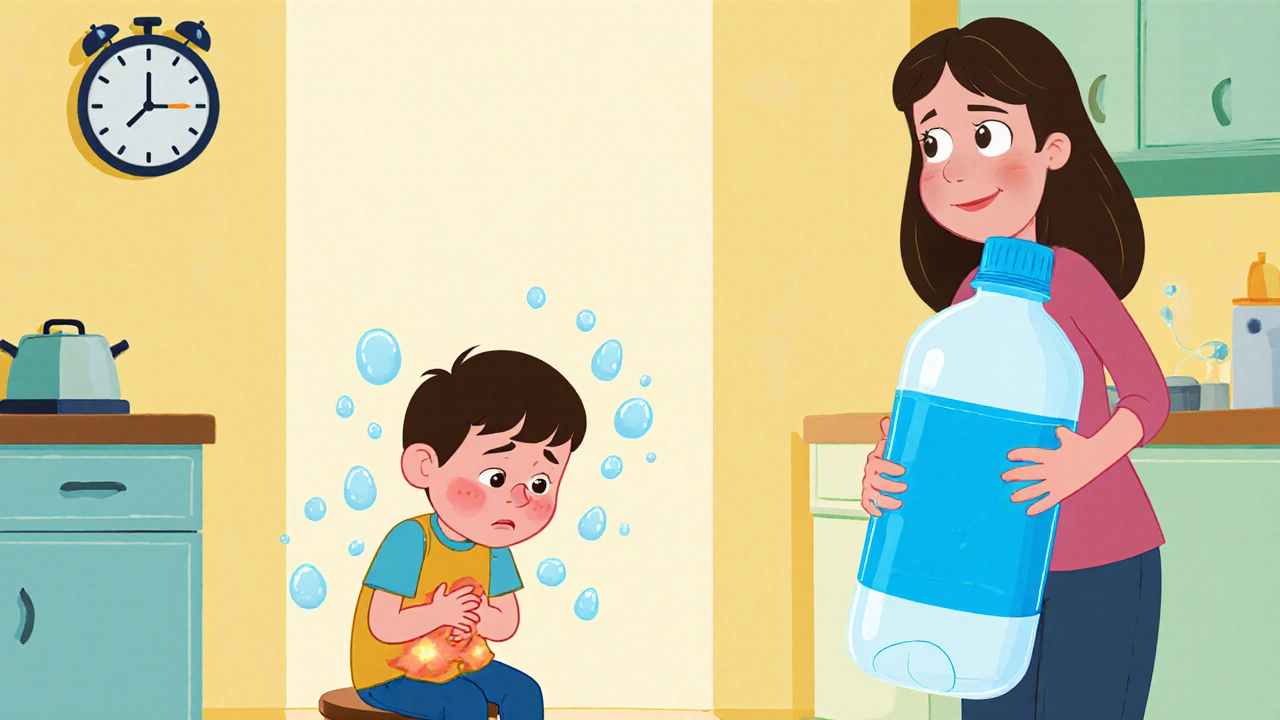ORS Dosing Calculator
Calculate Your ORS Needs
Your ORS Plan
Recommended Dose
Give this amount every 5-10 minutes for the first hour
Daily Fluid Goal
Spread throughout the day, especially during recovery
Important Notes
Give small sips frequently (5-10 ml per kg body weight every 5-10 minutes). If vomiting persists or symptoms worsen, stop and seek medical help. Never use sports drinks or soda as primary rehydration solution.
Seek Immediate Medical Help If:
You or your child have dark urine, lethargy, rapid heartbeat, or dry mouth. Persistent vomiting prevents fluid intake. Blood in stool or vomit.
When dehydration meets a rapid loss of water and electrolytes during gastroenteritisan inflammation of the stomach and intestines that causes vomiting and diarrhea, the risk of serious complications rises sharply. Staying properly hydrated isn’t just a comfort measure - it’s a vital part of recovery.
What Is Gastroenteritis?
Gastroenteritis is an infection or irritation of the gastrointestinal (GI) tract. The most common culprits are viruses like rotavirus and norovirus, but bacteria (e.g., Salmonella) and parasites can also be responsible. Symptoms typically appear within hours to a few days and include:
- Watery diarrhea
- Frequent vomiting
- Abdominal cramps
- Fever and chills
In healthy adults the illness often clears in 3‑5 days, but children, the elderly, and people with weakened immune systems can become seriously ill, mainly because they lose fluids faster than they can replace them.
How Dehydration Happens With Gastroenteritis
Every episode of vomiting or watery stool expels water, sodium, potassium, and other electrolytes that the body needs to keep blood pressure stable and cells functioning. If fluid loss exceeds intake, dehydration sets in. The brain senses the drop in blood volume, triggering thirst, dry mouth, and reduced urine output. In severe cases, the blood becomes more concentrated, leading to dizziness, rapid heartbeat, and even shock.
Warning Signs: When Fluid Loss Becomes Dangerous
It’s easy to dismiss a few dry lips as a minor issue, but certain signs call for immediate attention:
- Less than three wet diapers in 24 hours (infants) or urine that is dark yellow
- Persistent dry mouth, cracked lips, or a sunken fontanelle in babies
- Weakness, lethargy, or irritability that worsens
- Rapid breathing or a racing heartbeat
- Feeling dizzy when standing up (orthostatic hypotension)
If any of these appear, start rehydration measures right away and consider medical help.
Why Proper Hydration Matters
Dehydration isn’t just uncomfortable-it can turn a short stomach bug into a medical emergency. The body relies on a precise balance of water and electrolytes to:
- Maintain blood pressure and deliver oxygen to organs
- Support nerve transmission and muscle contraction
- Allow kidneys to filter waste efficiently
- Preserve cognitive function and mood
When the balance skews, you may see acute kidney injury, seizures (especially in children), or severe electrolyte disturbances such as hyponatremia.

Best Ways to Replenish Fluids
Not all drinks are equal when fighting dehydration caused by gastroenteritis. Below is a quick comparison of three common options.
| Option | Electrolyte Content | Sugar Level | Ideal For |
|---|---|---|---|
| Plain Water | None | None | Mild cases, supplement with salts |
| Sports Drinks | Moderate (Na⁺, K⁺) | High (often >6 g/100 ml) | Active adults, but may worsen diarrhea due to sugar |
| Oral Rehydration Solution (ORS) | Optimal (Na⁺ ≈ 75 mmol/L, K⁺ ≈ 20 mmol/L) | Low (≈ 2‑3 g/100 ml) | Children, infants, and anyone with moderate‑to‑severe fluid loss |
Health agencies-including the World Health Organization (WHO)-recommend ORS as the first‑line treatment for dehydration caused by diarrheal diseases.
How to Prepare Homemade ORS
If commercial packets aren’t handy, you can mix a safe homemade solution:
- Measure 1 liter (about 4 cups) of clean, boiled‑then‑cooled water.
- Add 6 level teaspoons of sugar.
- Add half a teaspoon of table salt.
- Stir until fully dissolved. The solution should taste like weak lemonade-not salty.
- Give small sips every 5‑10 minutes-about 5 ml per kilogram of body weight for the first hour.
For infants under six months, use a pediatric‑specific ORS or consult a doctor before giving any solution.
When to Seek Professional Care
Most mild cases resolve with home rehydration, but watch for red‑flag symptoms that demand medical attention:
- Persistent vomiting that prevents fluid intake
- Blood in stool or vomit
- Signs of severe dehydration (e.g., sunken eyes, no tears)
- High fever (≥ 38.5 °C) lasting more than 24 hours
- Diarrhea lasting longer than 5 days in adults or 3 days in children
In a clinic, doctors may administer intravenous (IV) therapy to replace fluids quickly, especially for infants, the elderly, or patients with underlying conditions.

Tips for Parents and Caregivers
Children are the most vulnerable group. Here are practical steps you can take:
- Offer ORS or breast‑milk frequently-don’t wait for the child to be thirsty.
- Avoid sugary sodas, fruit juices, and sports drinks that can worsen diarrhea.
- Keep the child’s environment cool and comfortable to reduce sweating.
- Wash hands thoroughly after diaper changes and before preparing any fluids.
- Monitor weight daily; a loss of more than 5 % of body weight signals a problem.
Quick Hydration Checklist
- Identify the cause (viral, bacterial, etc.) - rotavirus is common in kids under 5.
- Start ORS or a medically‑approved rehydration drink within the first hour of symptoms.
- Give 5‑10 ml per kilogram of body weight every 5 minutes for the first hour.
- Watch for warning signs: dark urine, lethargy, rapid heartbeat.
- Call a health professional if vomiting persists more than 24 hours or if the child is under 3 months old.
Frequently Asked Questions
How much ORS should an adult drink during gastroenteritis?
A typical adult needs about 2‑3 liters over the course of the illness, sipping 200‑250 ml every hour. Adjust upward if urine stays dark or you feel dizzy.
Can I use coconut water instead of ORS?
Coconut water contains potassium but often lacks the precise sodium level needed for rehydration. It can be a supplemental drink, but it shouldn’t replace a true ORS formulation.
Is dehydration more dangerous than the infection itself?
Yes. While most viral gastroenteritis cases are self‑limiting, severe dehydration can lead to kidney failure, seizures, or even death, especially in young children.
When is IV therapy necessary?
IV therapy is recommended when the patient cannot keep any fluids down, shows signs of severe dehydration, or has an underlying condition (e.g., heart disease) that makes oral rehydration risky.
What role does the New Zealand Ministry of Health play?
The Ministry provides national guidelines for managing gastroenteritis, distributes ORS packets in schools, and runs public awareness campaigns on safe hydration.
Staying on top of fluid loss can turn a miserable stomach bug into a quick recovery. Remember: a little sip of the right solution now can prevent a serious health crisis later.


sara fanisha
October 23, 2025 AT 14:47Staying on top of fluids is the simplest way to keep the bug from turning into a big problem.
A quick sip of ORS every few minutes can make a huge difference.
Tristram Torres
November 4, 2025 AT 06:24Too many people think a soda will fix dehydration, but the sugar just makes diarrhea worse and can even cause more vomiting.
Jinny Shin
November 15, 2025 AT 23:01Imagine the horror of a child gasping for breath while their tiny body wilts from fluid loss – that's the drama of untreated gastroenteritis, a catastrophe that could be averted with a humble glass of ORS.
deepak tanwar
November 27, 2025 AT 15:38While popular culture touts sports drinks as the panacea for any sweaty exertion, their sodium levels are insufficient for the massive electrolyte loss seen in severe diarrhoea; one should therefore favour medically‑approved ORS over sugary alternatives.
Abhishek Kumar
December 9, 2025 AT 08:15Plain water won’t cut it for severe cases.
hema khatri
December 21, 2025 AT 00:52Our Indian families have been using homemade sugar‑salt solutions for generations!!! It works, it’s cheap, and it beats any commercial gimmick!!!
Jennell Vandermolen
January 1, 2026 AT 17:29When you’re caring for a little one, keep the ORS within arm’s reach and offer a few teaspoons every five minutes – consistency beats volume every time.
Simon Waters
January 13, 2026 AT 10:06Watch out for hidden agendas in pharma‑sponsored ORS packets; sometimes the flavor additives are just a way to get brand loyalty while compromising the pure electrolyte balance.
Heather ehlschide
January 25, 2026 AT 02:43When you lose large volumes of watery stool, you’re not just losing water but also essential electrolytes like sodium and potassium. Sodium is the primary driver of fluid balance, pulling water back into the bloodstream. Potassium, on the other hand, is crucial for proper muscle and nerve function. The World Health Organization’s ORS formula contains about 75 mmol/L of sodium and 20 mmol/L of potassium, a ratio that mirrors the losses seen in acute diarrhoea. If you use a sports drink, the sodium content is often too low and the sugar too high, which can worsen osmotic diarrhoea. Homemade ORS, made with the correct 6 g of sugar and 0.5 g of salt per litre, achieves the same electrolyte balance without extra calories. Giving the solution in small, frequent sips helps the gut absorb the fluid more efficiently than a large gulp. For infants, the volume per dose should be about 5 ml per kilogram of body weight every few minutes. Adults can comfortably drink 200 ml every hour as long as they’re not feeling nauseous. Monitoring urine colour is a practical way to gauge hydration – pale straw colour indicates adequate intake. If urine stays dark, increase the ORS dose. Children who receive timely ORS have a dramatically lower risk of developing seizures due to hyponatremia. The kidneys will excrete excess water once electrolyte levels normalize, preventing fluid overload. In severe cases where the patient cannot keep any fluid down, intravenous therapy provides the same electrolyte composition directly into the bloodstream. Remember that rehydration is not just about quenching thirst; it’s about restoring the precise electrolyte milieu that keeps every organ functioning.
Kajal Gupta
February 5, 2026 AT 19:20Honestly, the science behind that 6‑to‑½‑teaspoon recipe is solid – it mimics the electrolyte profile the body loses, and the low sugar prevents feeding the gut bacteria that can worsen diarrhea.
Zachary Blackwell
February 17, 2026 AT 11:57Don’t be fooled by the “official” recipe; there are whispers that big pharma wants us to buy pricey sachets instead of using kitchen staples, so stick with the simple homemade mix.